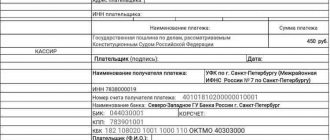A bill to reset the period of detention in a pre-trial detention center was introduced to the State Duma in June 2008. One of its authors was Tatyana Moskalkova, who now holds the post of Commissioner for Human Rights. “In accordance with the legislation of the Russian Federation, the conditions of detention of suspects and accused of committing crimes correspond to the strictest in terms of isolation, approximately the same as in prisons,” says the explanatory note to the bill. The authors of the document even cited decisions of the European Court of Human Rights, which indicated that conditions of detention should not be stricter than the conditions of the punishment imposed by the court. Therefore, it was proposed to change the existing procedure, when a day in a pre-trial detention center is equivalent to a day in a colony.
“What does this mean: that a person, while in a pre-trial detention center, endured more difficult conditions of detention than he should have endured, taking into account what the court handed down to him. Long visits are not allowed in a pre-trial detention center, a person is not allowed to work, and, of course, the difference between being in a pre-trial detention center and in a colony-settlement, where relatives can come, where a person can earn money, pay off debt, alimony, is completely different,” Moskalkova explained to Mediazone » the need to adopt a bill.
New rules for calculating sentence length
In a general regime colony and an educational colony: a day in a pre-trial detention center is equal to a day and a half in a colony.
In a colony-settlement: a day in a pre-trial detention center is equal to two days in a colony-settlement.
The old “one to one” principle will remain only for those who have been sent to prison, a maximum security or special regime colony by a court verdict.
The term of house arrest under the Criminal Procedure Code has until now been equal to the term in a pre-trial detention center on a day-to-day basis. Now one day under house arrest will be equal to half a day in a pre-trial detention center and half a day of imprisonment. Those who are already in a colony will not have their sentence increased (due to a reduction factor of 0.5) - the Criminal Code prohibits worsening conditions when new laws are adopted.
Those serving sentences will have to recalculate their sentences downwards in the near future. Within three months after the law comes into force, the sentences of prisoners in educational colonies and settlement colonies will be recalculated, and within six months - for all others.
Everything about criminal cases
Go to materials about preventive measures
Materials on counting sentences (spent in a pre-trial detention center, etc.)
| Normative base — 72 CC offset of sentence terms — Answers to questions from the courts regarding the application of 72 of the Criminal Code of July 31, 2019. Reducing the sentence Reducing the term punishment through detention in a pre-trial detention center, when it is beneficial? How is the term calculated in a pre-trial detention center? A day and a half later in a pre-trial detention center, how time spent in custody is taken into account RECEPTION protection Artificial tightening appeals to reduce the sentence Miscarriages of justice Miscarriages of justice when calculating deadlines, how to search and use |
Imprisonment may reduce the sentence
- it should be mentioned that a situation is possible where detention is even beneficial; this is possible if three conditions are met.
— there is an opportunity to “bite off” part of the sentence by accelerating the counting of time spent in a pre-trial detention center
.
Two conditions under which detention may be beneficial
| I | The actual deadline is predetermined - first condition: the article under which the culprit is prosecuted refers to the so-called landing articles , which imply only a real term of imprisonment as punishment. - soberly assess the prospects based on the severity of the article for which you are accused and the established judicial practice: it is possible that real punishment is inevitable. - that is, for your situation, the fact of detention does not affect the possibility of a suspended sentence, you can read more about this nuance here: Detention at the pre-trial stage reduces the likelihood of a suspended sentence. - if detention in custody is still a foregone conclusion, if not at the beginning of the investigation then at sentencing: then the time period during which the investigation and trial process takes place may even be advantageous to spend in a pre-trial detention center. |
| II | Accelerated crediting is possible - second condition: if circumstances allow for one-and-a-half or double crediting of the period of detention. The conditions for that test can be studied here: A day and a half in a pre-trial detention center, how the time spent in custody is taken into account. |
Expiration of the statute of limitations on appeal
— we also remind you that delaying the consideration of the case at the appeal stage may make sense if the limits of the statute of limitations for the crime are close. The fact is that within the meaning of Part 2 78 of the Criminal Code
and
clause of
Plenum No. 19, the statute of limitations is calculated until the sentence enters into legal force.
— you can read more about this opportunity here: Expiration
statute of limitations pending appeal, entails release.
How does being in a pre-trial detention center before trial count toward your sentence?
Url Additional information:
— Clause 9 Part 1 308 Code of Criminal Procedure
in the operative part of the sentence the term in the pre-trial detention center is read out
- when the court passes a sentence, then in the operative part of the sentence ( clause 9, part 1, 308 of the Code of Criminal Procedure
) he must perform arithmetic calculations using special formulas.
| I. A day and a half | One day in one and a half Url Additional information: - clause "b" part 1 58 of the Criminal Code cases when a general regime is prescribed - clause "b" part 3.1 72 of the Criminal Code general regime and educational colony - 1 day for 1.5 days -one day spent in a pre-trial detention center can be counted as one and a half days in places of deprivation of liberty in cases provided for in paragraph "b" part 1 of 58 of the Criminal Code and |
| II. Day in two | One day in two days Url Additional information: - clause "a" part 1 58 of the Criminal Code cases when a colony settlement is assigned - clause "c" part 3.1 72 of the Criminal Code if a colony settlement is assigned - 1 day in 2 days - one day spent in a pre-trial detention center can be counted as two days in places of deprivation of liberty in cases provided for in paragraph “a”, part 1 of 58 of the Criminal Code and |
Recalculation of sentences is possible after the verdict
— the possibility of counting deadlines is strictly tied to the type of regime
correctional institution (and that depends on
the category of crime
). If the category is severe, then the regime is strict - accordingly, there will be no counting of terms. But both of them can be changed:
A)
the regime can be changed as a result of a successful appeal - if the qualification is changed to a less serious article.
In this case, the conditions for assigning the type of regime provided for in 58 of the Criminal Code
- and the court is obliged to assign a different regime.
What can open the way to the application of clause “b” part 3.1 72 of the Criminal Code
and
clause “c” part 3.1 72 of the Criminal Code
.
b)
separately (without reclassification to a mild article), the category of crime can be reduced using the mitigating mechanism provided for
in Part 6 of 15 of the Criminal Code
.
(You can read more about this here: Changing the category of
crime).
Note
: It may be unnecessary to talk about this (but someone’s thoughts may go down the wrong path).
Therefore, it’s better to say: there is also such a mechanism as “re-regime” - changing the type of correctional institution in accordance with 78 Penal Code
. So, in this case, there is no need to talk about any offset of deadlines. The counting of terms is possible only when the sentence is changed, but the overtime is not associated with a change in the sentence.
Miscarriages of justice
— please note: the most important material for practitioners in this area is a selection on how to look for errors in order to appeal a verdict. You can read it here: Miscarriages of Justice
when setting off deadlines, how to search and use.
Return to materials on preventive measures
Seek advice
But there are exceptions
After the first reading, a list of articles of the Criminal Code was added to the bill, for which the term, regardless of the regime of the colony, will be taken into account at a one-to-one ratio: terrorism (205–205.5 of the Criminal Code), hostage-taking (parts 3 and 4 of Article 206 of the Criminal Code), aircraft hijacking , ship or train (Part 4 of Article 211 of the Criminal Code), treason (275 of the Criminal Code), espionage (276 of the Criminal Code), international terrorism (361 of the Criminal Code). In addition, under articles on encroachment on the life of an official or public figure (277 Criminal Code), seizure of power (278 Criminal Code), armed rebellion (279 Criminal Code) and attack on persons under international protection (360 Criminal Code), the “one to one” rule will apply if these crimes are “related to the implementation of terrorist activities.”
There will also be no conversion of sentences for those convicted under articles on possession of drugs on a large and especially large scale (parts 2 and 3 of Article 228), production and sale (228.1 of the Criminal Code) and theft of drugs (229 of the Criminal Code).
In addition, a day in a pre-trial detention center will be counted as one day of the assigned sentence for “particularly dangerous recidivism of crimes” and for convicts whose death penalty was commuted to life or 25 years in prison.
If, after being sent to a colony, the convict was placed in a punishment cell or disciplinary cell (or a cell-type facility), then the days of such punishment will also be recalculated “one to one.” Based on the text of the bill, this means an increase in the total term of punishment if a punishment is applied to the convicted person (days in the pre-trial detention center will be “subtracted” from the term counted after the pre-trial detention center). How this measure will be applied in practice was not explained during the discussion of the document in the State Duma.
News
MOSCOW, June 21 – RAPSI. The State Duma of the Russian Federation approved in the third (final) reading amendments to the Criminal Code, according to which the procedure for counting the time a person is held in custody before the court verdict enters into force will be changed in the term of serving a sentence of imprisonment.
Changes are being made to Article 72 of the Criminal Code of the Russian Federation. The proposed procedure is based on the application of a coefficient when calculating the term of serving a sentence, as well as the type of correctional institution appointed by the court.
Thus, it is proposed that the time a person is held in custody before the court decision enters into legal force should be counted towards the term of serving the sentence as follows. When serving a sentence in a disciplinary military unit, the rate is one day per day and a half. In case of restriction of freedom, forced labor and arrest - one day in two days. For correctional labor and restrictions on military service - one day in three days. In the case of compulsory work - at the rate of one day of detention for eight hours of compulsory work.
In case of deprivation of liberty, it is proposed to count one day of a person’s detention in a pre-trial detention center as follows. When serving a sentence in prison and correctional colonies of special and strict regime - in one day. When serving a sentence in a general regime correctional colony or educational colony - one and a half days. When serving a sentence in a penal colony - two days.
It is not envisaged that the proposed procedure will be extended to persons convicted of committing particularly serious crimes; crimes related to terrorist activities; in case of a particularly dangerous relapse; as well as in relation to convicts for whom the death penalty by way of pardon has been replaced by imprisonment.
Also, the specified increasing coefficient will not be applied while the convicted person is in a punishment cell or disciplinary cell, a cell-type room, or a single cell-type room in the event of punitive measures being applied to the convicted person.
The time a person is under house arrest, included in the period of his detention pending trial, is proposed to be counted at the rate of two days for one day of imprisonment.
The bill will have retroactive effect. The provisions of this federal law are subject to execution within three months from the date of its entry into force in relation to persons serving a sentence of imprisonment in an educational colony or a colony-settlement.
Within six months from the date of entry into force of the federal law, the provisions are subject to enforcement in relation to: persons serving a sentence of imprisonment in a general regime correctional colony; persons serving sentences in the form of compulsory labor, correctional labor, restriction of freedom, forced labor; military personnel serving a sentence in the form of restrictions on military service and serving a sentence in the form of detention in a disciplinary military unit.
The bill was submitted to the State Duma back in 2008 and adopted in the first reading in 2015, and in the second reading on June 20, 2018.
The day before, the Commissioner for Human Rights in the Russian Federation, Tatyana Moskalkova, told RAPSI that she supports the adopted amendments, which are aimed at humanizing criminal legislation. According to Moskalkova, when she was a deputy of the State Duma of the fifth convocation, she began working on this bill as part of a general program for the humanization of criminal procedure, penal legislation and the Criminal Code as a whole. Numerous appeals to her and to Pavel Krasheninnikov (head of the State Duma Committee on Legislation - approx. RAPSI) allowed us to conclude that people perceive detention in a pre-trial detention center to be just as unfair as being in a penal colony or in a general colony mode. Not a single bill, as the commissioner noted, can be long-term and accepted by society if there is no public demand. There was such a request, so a bill was born, the meaning of which is to restore justice if a person has suffered greater hardships than was later determined for him by the court.
Last news
Bill 73983-5 was submitted to the State Duma back in 2008 and was thus considered for more than ten years. It waited for the first reading until 2015, but even then it was not immediately adopted. According to the authors of the bill, such a long consideration is due to disagreements regarding the rules for recalculating deadlines. After all, now we will have to recalculate the terms of stay in places of detention for a very large number of people.
Once again, legislators decided to consider the bill “a day and a half in a pre-trial detention center” in 2022. In the third reading, the bill was approved unanimously. Amendments were made to expand the list of articles that are not covered by the new rule.
The authors of the bill justify its adoption by the need to apply the principle of fairness when citizens serve a sentence of imprisonment in places of detention. They argue that the conditions in the pre-trial detention center are much worse than in those correctional institutions in which the majority of citizens will subsequently be kept. In pre-trial detention centers there is no opportunity to engage in any type of activity; prisoners are kept in closed cells and only have the right to an hour-long walk once a day. Thus, the conditions are practically equivalent to prison conditions and it would be more fair to count a day and a half in a pre-trial detention center.
The State Duma equated one day in a pre-trial detention center to one and a half days in a general regime colony
On Thursday, June 21, the State Duma, in the third and final reading, adopted amendments to the Criminal Code, equating one day in a pre-trial detention center to one and a half days in a general regime colony and two days in a settlement colony. The bill was pending for ten years.
The law introduces the procedure for applying the coefficient when calculating the term of serving a sentence, as well as the type of correctional institution appointed by the court.
In case of deprivation of liberty, it is proposed to count one day of detention in a pre-trial detention center as follows: when serving a sentence in a prison and correctional colonies of strict and special regime - for 1 day. When serving a sentence in a general regime correctional colony or educational colony - 1.5 days. When serving a sentence in a penal colony - 2 days.
The time a person is held in custody before the court verdict enters into legal force is counted towards the term of serving the sentence as follows: when serving a sentence in a disciplinary military unit - one day for 1.5 days. In case of restriction of freedom, forced labor and arrest - one day for 2 days. For correctional labor and restrictions on military service - one day in 3 days. In the case of compulsory work - at the rate of 1 day of detention for 8 hours of compulsory work.
The time a person is under house arrest will be counted towards the period of pre-trial detention and the period of imprisonment - at the rate of 2 days of house arrest for 1 day of being in a pre-trial detention center and imprisonment.
The law will have retroactive effect and will apply to those who are currently in prison.
“The court will deal with this. And accordingly, when submitting an application, the terms of maintenance will be recalculated,” explained Pavel Krasheninnikov, Chairman of the Committee on State Construction and Legislation. The term of serving the sentence will be reduced for a significant number of convicts, he is sure.
Within three months from the date of entry into force of the law, it will begin to apply to persons serving a sentence in an educational colony and a settlement colony, and within six months - to those serving a sentence in a general regime correctional colony; persons serving sentences in the form of compulsory, corrective, forced labor; restrictions on freedom; as well as in relation to military personnel serving a sentence in a disciplinary military unit and in the form of restrictions on military service.
At the same time, the law will not apply to those serving sentences for terrorism, for especially serious crimes related to drug trafficking, encroachment on the constitutional order, for dangerous repeat offenders, as well as for convicts for whom the death penalty by way of pardon has been replaced by life imprisonment or imprisonment freedom for a period of 25 years.
The initiative was submitted to the State Duma back in 2008. The bill passed its second reading on June 20, 2022.








